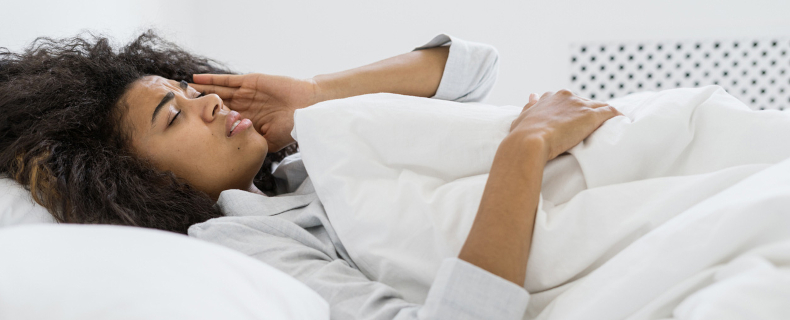
San Francisco and Marin CA
The pain of a persistent toothache is not something a person wants to feel at any time of day, but it can be even worse at night. Part of this may be psychological: during the day there is always the possibility that one can see a dentist, but at night that possibility often does not exist since it is after hours. This can make it seem worse than it is.
On the other hand, sometimes a toothache is not there during the day and all of a sudden pops up at night. Furthermore, a toothache that happens during the day may not just seem worse at night; it may actually be worse. There are a few reasons for this. What are they?
Causes
For a toothache that is not there during the day but seems to strike from out of nowhere (without an obvious explanation, like damage to the tooth) at night, one cause might be sinuses. Sinus pressure can sometimes be felt in the teeth, and the weather patterns might have changed at night. Stress headaches can also have a dental component, such that the buildup of stress during the day reaches the point of pain at night.
Furthermore, the pain may have been caused by bruxism, or nighttime tooth-grinding. Grinding can cause pain in the teeth in and of itself and can cause pain in the jaws and head. Furthermore, those with sleep apnea – which is typically caused by relaxation of the tissues in the mouth, cutting off airflow and waking the sleeper to restore breathing – also tend to have bruxism. The conditions occur together in about half of all sufferers, and at least one study suggests that the clenching of the jaw is the body’s way of causing the sleeper to wake.
Sometimes a meal eaten at night can aggravate cavities, which may become apparent right away or not be noticed for hours. This is especially true for anything acidic, sugary, overly hot, or overly cold.
Another reason is that at night, and especially in bed, the mind has fewer distractions. A mild ache might become worse because it no longer has to share the “mental spotlight” with other daytime concerns.
Finally, laying down increases the blood flow to the head. This can put pressure on sore spots that are not there during the day.
Nighttime toothache: what can be done?
If the teeth are hurting because they have been damaged, and if the pain is so intense that it cannot be tolerated, one possible solution is to call a dentist. One’s regular dentist may have an after-hours number to call; alternatively, many communities have nighttime emergency dentists who can help.
If the pain is not so excruciating that it cannot be managed, there are some ways to help reduce it at home. Possibly the simplest is to make sure to brush and floss at night, just in case the ache is caused by something in the teeth. Furthermore, foods that irritate the teeth at night – such as those high in acid and sugar or are very hot and cold – should be avoided.
Beyond these, there are some other actions that can be taken:
- Over-the-counter pain relievers
Acetaminophen and ibuprofen can help reduce pain, even that caused by tension headaches/toothaches. Likewise, a decongestant can help with tooth pain caused by sinus pressure. Finally, benzocaine gels can be applied directly and might provide assistance, though these should only be used by adults.
Home remedies
A number of at-home remedies have shown the ability to help in some circumstances.
Peppermint – such as in peppermint tea, ideally not taken with sugar – can have antibacterial properties, and the menthol in it can have a numbing, cooling effect.
Cloves contain a substance called eugenol, which scientists have determined can have a pain-reducing effect. A cotton ball soaked in clove oil, a paste made from ground clove leaves and applied directly in an empty tea bag, or even sucking on a clove can help with tooth pain, though this is not encouraged for children, as too much eugenol can be harmful.
When crushed, garlic temporarily produces a substance called allicin, which can kill bacteria and the pain-producing acid it produces. Chewing raw garlic may help with toothache, though its taste is very strong.
- Rinses
Some mouthwashes contain disinfectant chemicals like alcohol that may help with pain. A rinse with diluted hydrogen peroxide (at about a 2:1 ratio with water if the peroxide is 3%) or a salt solution (half a teaspoon of salt in eight ounces of water) may be beneficial for the same reasons.
- Cold compress/icepack
Cold is well-known for the numbing effect it causes, so one potential remedy for nighttime toothache would be to apply ice or an ice pack in a clean cloth to the side of the head. This may also reduce swelling.
- Elevate the head at night
Since increased blood flow to the head when laying down can make pain worse, raising the head slightly (using pillows) may reduce the blood flow and help with the pain.
Seeking care
If toothaches happen every night, it may be time to seek dental care. Glen Park dentistry provides comprehensive dental options for people of all ages in the San Francisco area and beyond, including fixing broken teeth and cavities and fitting oral appliances to help with bruxism and sleep apnea. An appointment for a consultation can be made on the website or by phone at (415) 799-3900. The first step toward fixing nighttime tooth pain may be just one phone call away.


